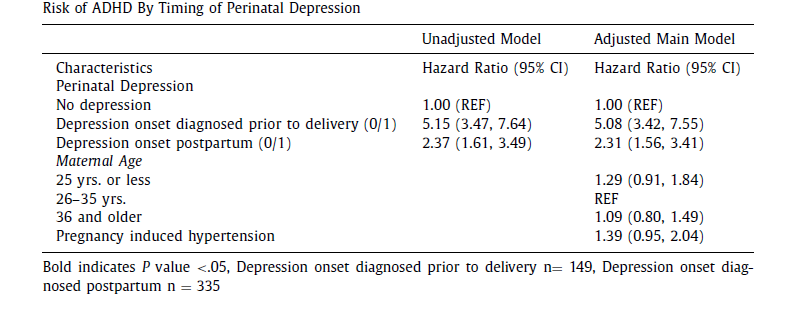Perinatal Depression May Triple the Risk of ADHD in Children
Research By: Nichole Nidey, PhD | Tanya Froehlich, MD, MS
Post Date: August 17, 2021 | Publish Date: June 26, 2021

“One of my goals as a researcher is to identify risk factors where we can intervene to improve health outcomes.”
–Nichole Nidey, PhD
Children born to mothers with perinatal depression face a higher risk for attention deficit hyperactivity disorder (ADHD), according to a study led by experts at Cincinnati Children’s.
The population-based study, published online in the journal Annals of Epidemiology, is among the first to examine this association across the perinatal time period—from prenatal to postpartum. The findings further support the idea that improving a mother’s health can influence a child’s health long after pregnancy and delivery.
“ADHD is a complex disorder, meaning that the risk is likely influenced by a combination of factors, including genetics and environmental risk factors,” says lead author Nichole Nidey, PhD, of the Divisions of Developmental and Behavioral Pediatrics and Biostatistics and Epidemiology. “One of my goals as a researcher is to identify risk factors where we can intervene to improve health outcomes.”
Although previous studies had identified perinatal depression as a risk factor for ADHD, many were based on self-report of maternal depression or diagnosis of ADHD among children. In this study, researchers examined insurance claims data from a population-based sample of privately insured mother-child pairs, reducing the self-report and selection bias of prior studies.
Among the 5,635 mother-child pairs, 484 mothers were diagnosed with depression during the perinatal period, and 269 children were diagnosed with ADHD. Overall, researchers found that children born to mothers with perinatal depression were over three times more likely to be diagnosed with ADHD.
“These results suggest that programs to prevent depression in pregnant women have the potential to reduce risk of ADHD in their children,” says co-author Tanya Froehlich, MD, MS, Director of Research, Division of Developmental and Behavioral Pediatrics. “They also suggest that children born to women with depression during pregnancy should be carefully monitored for ADHD-related concerns. This way, families can receive help and support if ADHD does develop without undue delay.”
Insights from the study can not only help identify these high-risk groups—they can also help personalize the care they receive.
“The Cincinnati Children’s Center for ADHD offers evidence-based parent behavior training programs that can reduce the child oppositional behaviors and parent-child conflict that so frequently travel with ADHD,” says Froehlich. “Moms who have pre-existing mental health issues like depression are particularly vulnerable in the face of child oppositional behaviors and family conflict, making these programs a critical part of the treatment process for these families.”
Next, researchers aim to examine how depression treatment modalities can influence health outcomes for mothers and children throughout their life course.
“As we can see in this research and many other studies that have come before this, mental health conditions such as depression not only effect those personally experiencing them, but can also exert a generational effect,” says Nidey. “I hope studies such as this one will add to the evidence base needed to support policies that facilitate better access to mental health care.”
| Original title: | Association between perinatal depression and risk of attention deficit hyperactivity disorder among children: a retrospective cohort study |
| Published in: | Annals of Epidemiology |
| Publish date: | June 26, 2021 |
Research By









